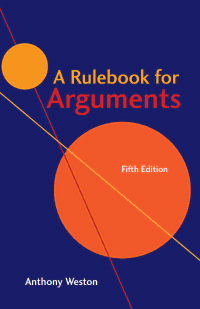
A Rulebook for Arguments PDF
Preview A Rulebook for Arguments
Cover Page: i A Rulebook for Arguments Page: i Title Page Page: iii Copyright Page: iv Titles of Related Interest Available from Hackett Publishing Page: iv Contents Page: v Preface Page: ix Note to the Fifth Edition Page: x Introduction Page: xiii I. Short Arguments: Some General Rules Page: 1 1. Resolve premises and conclusion Page: 1 2. Unfold your ideas in a natural order Page: 3 3. Start from reliable premises Page: 4 4. Be concrete and concise Page: 5 5. Build on substance, not overtone Page: 6 6. Use consistent terms Page: 7 II. Arguments by Example Page: 9 7. Use more than one example Page: 10 8. Use representative examples Page: 11 9. Background rates are often crucial Page: 13 10. Statistics need a critical eye Page: 14 11. Reckon with counterexamples Page: 16 III. Arguments by Analogy Page: 19 12. Analogies require relevantly similar examples Page: 20 IV. Arguments from Authority Page: 23 13. Cite your sources Page: 24 14. Seek informed sources Page: 25 15. Seek impartial sources Page: 27 16. Cross-check sources Page: 28 17. Build your Internet savvy Page: 30 IV. Arguments about Causes Page: 33 18. Causal arguments start with correlations Page: 33 19. Correlations may have alternative explanations Page: 34 20. Work toward the most likely explanation Page: 36 21. Expect complexity Page: 38 VI. Deductive Arguments Page: 39 22. Modus ponens Page: 40 23. Modus tollens Page: 41 24. Hypothetical syllogism Page: 42 25. Disjunctive syllogism Page: 43 26. Dilemma Page: 44 27. Reductio ad absurdum Page: 45 28. Deductive arguments in multiple steps Page: 47 VII. Extended Arguments Page: 51 29. Explore the issue Page: 51 30. Spell out basic ideas as arguments Page: 53 31. Defend basic premises with arguments of their own Page: 55 32. Reckon with objections Page: 57 33. Explore alternatives Page: 58 VIII. Argumentative Essays Page: 61 34. Jump right in Page: 61 35. Urge a definite claim or proposal Page: 62 36. Your argument is your outline Page: 63 37. Detail objections and meet them Page: 65 38. Seek feedback and use it Page: 66 39. Modesty, please! Page: 67 IX. Oral Arguments Page: 69 40. Ask for a hearing Page: 69 41. Be fully present Page: 70 42. Signpost energetically Page: 71 43. Hew your visuals to your argument Page: 72 44. End in style Page: 73 X. Public Debates Page: 75 45. Do argument proud Page: 75 46. Listen, learn, leverage Page: 76 47. Offer something positive Page: 78 48. Work from common ground Page: 80 49. At least be civil Page: 82 50. Leave them thinking when you go Page: 83 Appendix I: Some Common Fallacies Page: 87 Appendix II: Definitions Page: 95 D1. When terms are unclear, get specific Page: 95 D2. When terms are contested, work from the clear cases Page: 97 D3. Definitions don’t replace arguments Page: 99 Resources Page: 101 Back Cover Page: 102
Description: